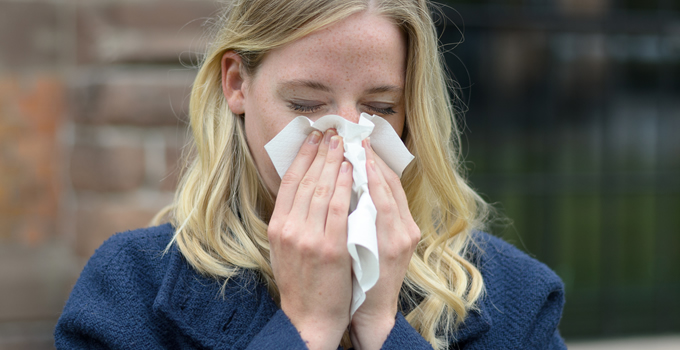
Seasonal Allergies
In the spring and summer, pollen, grasses, and weeds can be potential sources of sneezing and watery eyes. In the fall and winter, triggers may include ragweed, mold, and dust mites. Whatever it is that makes seasonal allergies a problem for you, rest assured that you're not alone. Millions of Americans experience similar reactions at different times of the year. While there is no cure for seasonal allergies, symptoms can be managed and minimized.
What Causes Seasonal Allergies?
It's usually some type of airborne allergen that triggers seasonal allergies. Pollen and ragweed are the most common seasonal allergens, although some people are sensitive to mold spores and other particles that can be found in indoor or outdoor air.
Allergens set of a chain reaction in your immune system, which views the allergens as invaders and produces antibodies called immunoglobulin E (IgE) that release chemicals and trigger allergic reactions. Seasonal allergies may produce the following symptoms:
- Sneezing and stuffiness
- Itchiness in the nose
- Throat and ear irritations
- Watery itchy eyes
Getting an Accurate Diagnosis
Symptoms associated with seasonal allergies are sometimes similar to other ear, nose, and throat problems, especially in children showing possible signs of having allergies. Children with nasal allergies are more susceptible to developing asthma and similar respiratory conditions.
Accurately diagnosing allergies with either an allergy skin test or a serum-specific IgE antibody test (blood test) may minimize ear infections in both children and adults. In some cases, allergies result in fluid buildup behind the eardrum. In situations like this, diagnosis often includes eliminating possible ear problems from other sources and confirming whether or not allergies are the main contributing factor to symptoms.
Treatment Options and Prevention
Avoidance is the treatment that is often suggested for anyone with seasonal allergies. This means paying attention to things like pollen counts and being careful with which days you go outside. Hay fever symptoms, for instance, tend to be less problematic on days when its cloudy since pollen and other airborne allergens are more active on hot, dry, windy, and sunny days. Keeping indoor air clean and dry with a dehumidifier can also help ease symptoms. Treatment may also involve:
- Antihistamines to minimize watery eyes and sneezing
- Nasal steroids to decrease mucus production
- Cromolyn sodium nasal spray to block hay fever symptoms
- Decongestants to reduce sinus discomfort and swelling
- Immunotherapy (allergy shots)
Seasonal allergies that produce symptoms such as coughing, excessive swallowing, and difficulty speaking sometimes lead to a sore throat that will also require treatment. Further throat irritation can be minimized by identifying specific allergy triggers and receiving an appropriate treatment to reduce the severity of symptoms to keep throat tissues from becoming irritated. Proper treatment for allergies can also reduce issues with related ear infections.
Many seasonal allergy sufferers are able to effectively manage their symptoms by avoiding their specific triggers and using over-the-counter or prescription medications. If you're not sure what your specific allergy triggers are, or if you are experiencing severe symptoms and related throat or ear infections or irritations that may or may not be allergy-related, you'll likely be referred to an ear, nose, and throat specialist for further evaluation.

